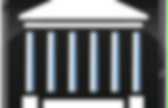

From Debt to Banking to Nation Debt to Austerity. Is an Anti-Austerity Alliance of Left Neo-classicals and Post-Keynesians Possible? Is it Desirable? (Part 2) — www.nakedcapitalism. By Michael Hoexter.
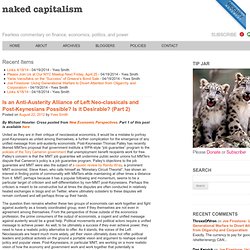
Cross posted from New Economic Perspectives. Part 1 of this post is available here United as they are in their critique of neoclassical economics, it would be a mistake to portray post-Keynesians as united among themselves, a further complication for the emergence of any unified message from anti-austerity economists. Post-Keynesian Thomas Palley has recently likened MMTers proposal that government institute a WPA-style “job guarantee” program to the policies of the Tory Cameron government that unemployment benefit recipients work for free. Palley’s concern is that the MMT job guarantee will undermine public sector unions but MMTers dispute that Cameron’s policy is a job guarantee program. The question then remains whether these two groups of economists can work together and fight against austerity as a loosely coordinated group, even if they themselves are not even in agreement among themselves. Political and Epistemological Choices.
MMT Movie: Economics for Dummiez. Debt, Deficits, and Modern Monetary Theory. Bill Mitchell is the Research Professor in Economics and the Director of the Centre of Full Employment and Equity at the University of Newcastle, Australia.
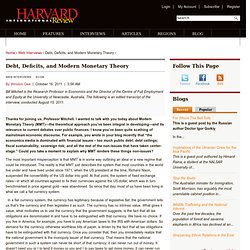
The following is an edited transcript of the interview, conducted August 15, 2011. Thanks for joining us, Professor Mitchell. I wanted to talk with you today about Modern Monetary Theory (MMT)—the theoretical approach you’ve been integral in developing—and its relevance to current debates over public finances. I know you’ve been quite scathing of mainstream economic discourse. For example, you wrote in your blog recently that “the economics media is dominated with financial issues – too much public debt; debt ceilings; fiscal sustainability; sovereign risk; and all the rest of the non-issues that have taken center-stage.”
Michael Hudson - What We're Becoming (1 of 4) A very British coup – but made in Chicago. This post is highly likely to be provocative – and may lead you to think I’m paranoid.

If so, ah well. The facts speak for themselves, I think. I only started writing this blog about 6 weeks ago. The Origins of Neoliberalism Part IV: A Map of Hayek’s Delusion. Heterodox economics. The rentier economy « Michael Roberts Blog. There has been some useful analysis on the state of the UK economy following the release of the Q4’2012 GDP figures last week (see my last post, Britain deep down).
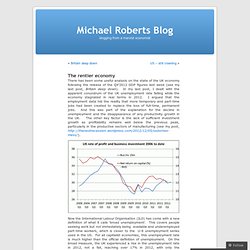
In my last post, I dealt with the apparent conundrum of the UK unemployment rate falling while the economy stagnated in real terms in 2012. I argued that the employment data hid the reality that more temporary and part-time jobs had been created to replace the loss of full-time, permanent jobs. Britain's £1m and £100m banknotes. 25 January 2013Last updated at 21:09 ET By Chris Bowlby BBC Radio 4 Carefully guarded in the Bank of England's vaults are a small number of very large banknotes.

Called "giants" and "titans", they are not in circulation for good reason - each is worth a sum of money most of us can only dream of. What are they for? "When it comes to a £1m note, everybody thinks, 'What a fantastic thing'," says Barnaby Faull, head of the banknote department at the auctioneers Spink. Meme Wars is a textbook for a new way of thinking. Meme Wars: The Creative Destruction of Neoclassical Economics Edited by Kalle Lasn with Adbusters.
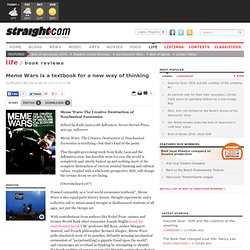
Seven Stories Press, 400 pp, softcover Meme Wars: The Creative Destruction of Neoclassical Economics is terrifying—but that's kind of the point. This thought-provoking work from Kalle Lasn and the Adbusters crew, has horrible news for you: the world is completely and utterly fucked up and nothing short of the complete destruction of current societal thinking and cultural values, coupled with a wholesale perspective shift, will change the certain doom we are facing.
(Overwhelmed yet?) From Debt to Banking to Nation Debt to Austerity. Property is Theft. Mises was never keen to speak in terms of ethics, but the following excerpt from Socialism does a brilliant job dispatching the notion that ownership of property must necessarily preclude others from the benefits derived, To have production goods in the economic sense, i.e. to make them serve one’s own economic purposes, it is not necessary to have them physically in the way that one must have consumption goods if one is to use them up or to use them lastingly.
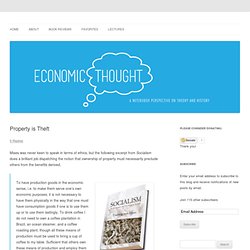
To drink coffee I do not need to own a coffee plantation in Brazil, an ocean steamer, and a coffee roasting plant, though all these means of production must be used to bring a cup of coffee to my table. Papers. Paper No.11 Britain’s Post Crisis Political Economy: A ‘Recovery’ through Regressive Redistribution Jeremy Green (SPERI Research Fellow) and Scott Lavery Abstract In this paper Green and Lavery question the foundations of Britain’s much-vaunted economic recovery.

They argue that, acting in tandem, the impact of Quantitative Easing and key processes of labour market restructuring have made the burden of economic adjustment highly regressive, redistributing wealth upwards and privileging asset-holders. SPERI Paper No. 11: Britain’s Post Crisis Political Economy: a ‘Recovery’ through Regressive Redistribution. Opinion. Bankers, exposed. I’ve thoroughly enjoyed reading The Bankers’ New Clothes: What’s Wrong with Banking and What to do About It by Anat Admati and Martin Hellwig.
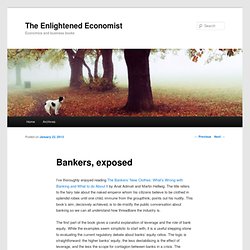
The title refers to the fairy tale about the naked emperor whom his citizens believe to be clothed in splendid robes until one child, immune from the groupthink, points out his nudity. A brief history of macro: How we got here. What is Neoliberalism? BY Doug Nicholls Neoliberalism is a set of economic policies that have become widespread during the last 30 years or so bringing misery to people and the environment as well as war and economic collapse, terrorism and a new form of gullible individualism.
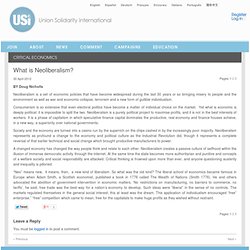
Consumerism is so extensive that even electoral politics have become a matter of individual choice on the market. Yet what is economic is deeply political: it is impossible to split the two. Neoliberalism is a purely political project to maximise profits, and it is not in the best interests of workers. It is a phase of capitalism in which speculative finance capital dominates the productive, real economy and finance houses achieve, in a new way, a superiority over national governments. L.php?u=http%3A%2F%2Fwww.youtube. Recovered Economic History: "Everyone but an Idiot Knows That the Lower Classes Must Be Kept Poor, or They Will Never Be Industrious" “…everyone but an idiot knows that the lower classes must be kept poor, or they will never be industrious.” —Arthur Young; 1771 Our popular economic wisdom says that capitalism equals freedom and free societies, right?
Well, if you ever suspected that the logic is full of shit, then I’d recommend checking a book called The Invention of Capitalism, written by an economic historian named Michael Perelmen, who’s been exiled to Chico State, a redneck college in rural California, for his lack of freemarket friendliness. And Perelman has been putting his time in exile to damn good use, digging deep into the works and correspondence of Adam Smith and his contemporaries to write a history of the creation of capitalism that goes beyond superficial The Wealth of Nations fairy tale and straight to the source, allowing you to read the early capitalists, economists, philosophers, clergymen and statesmen in their own words.